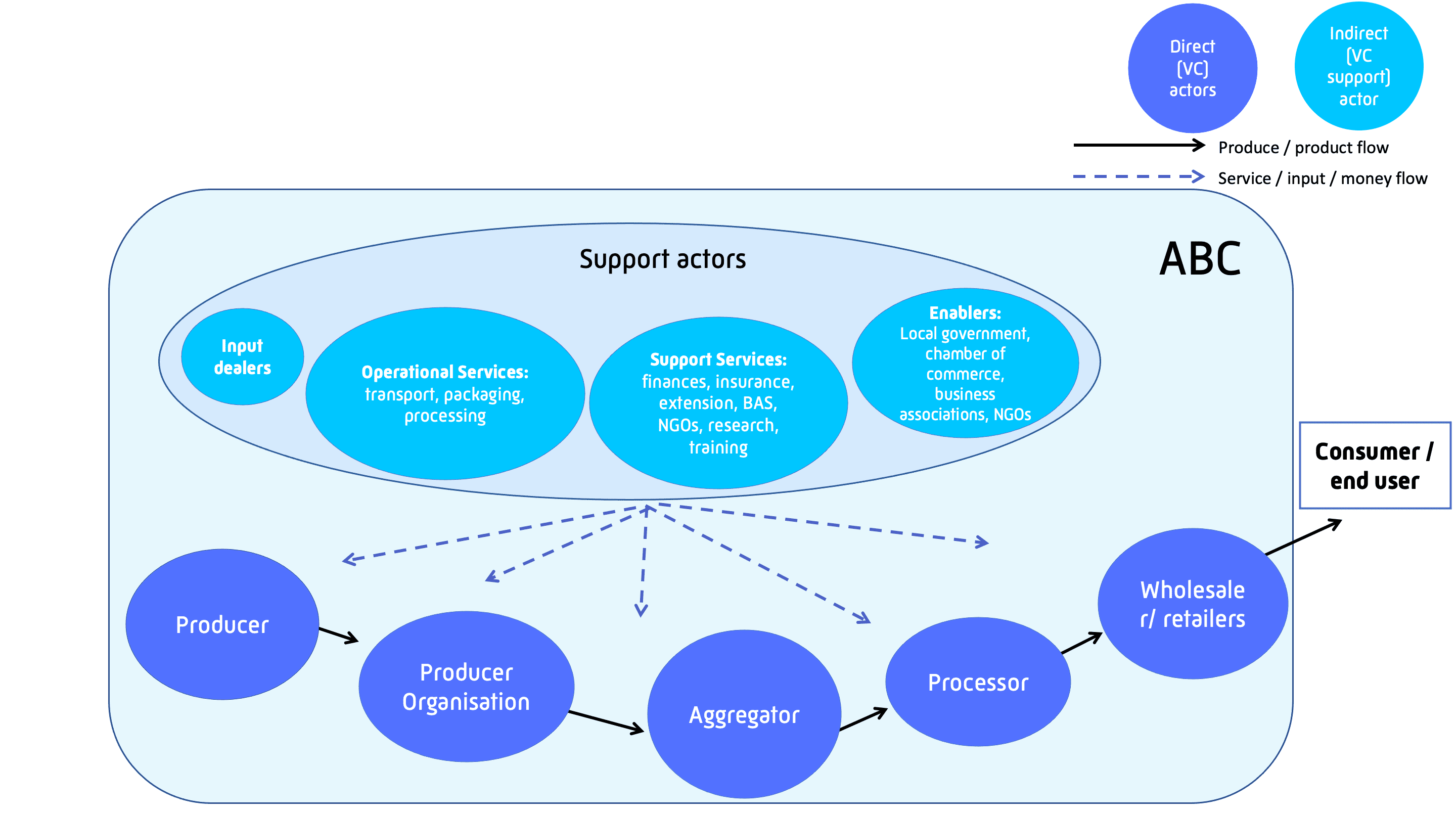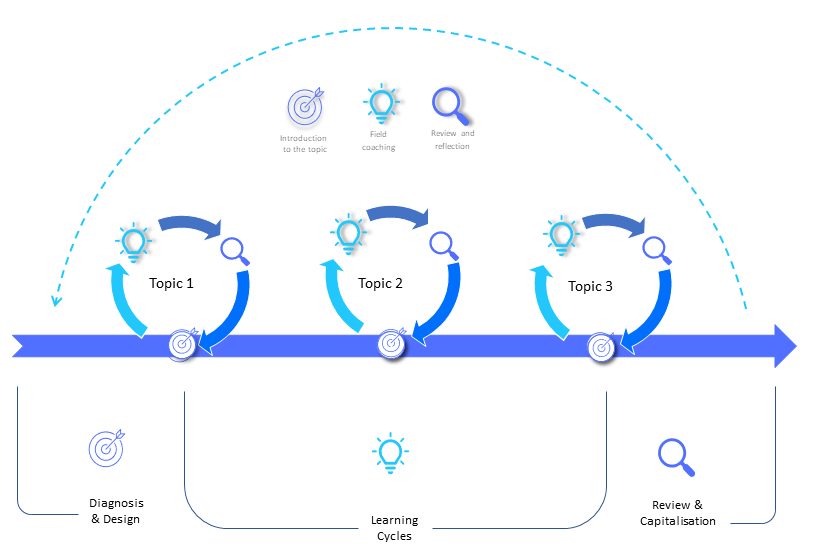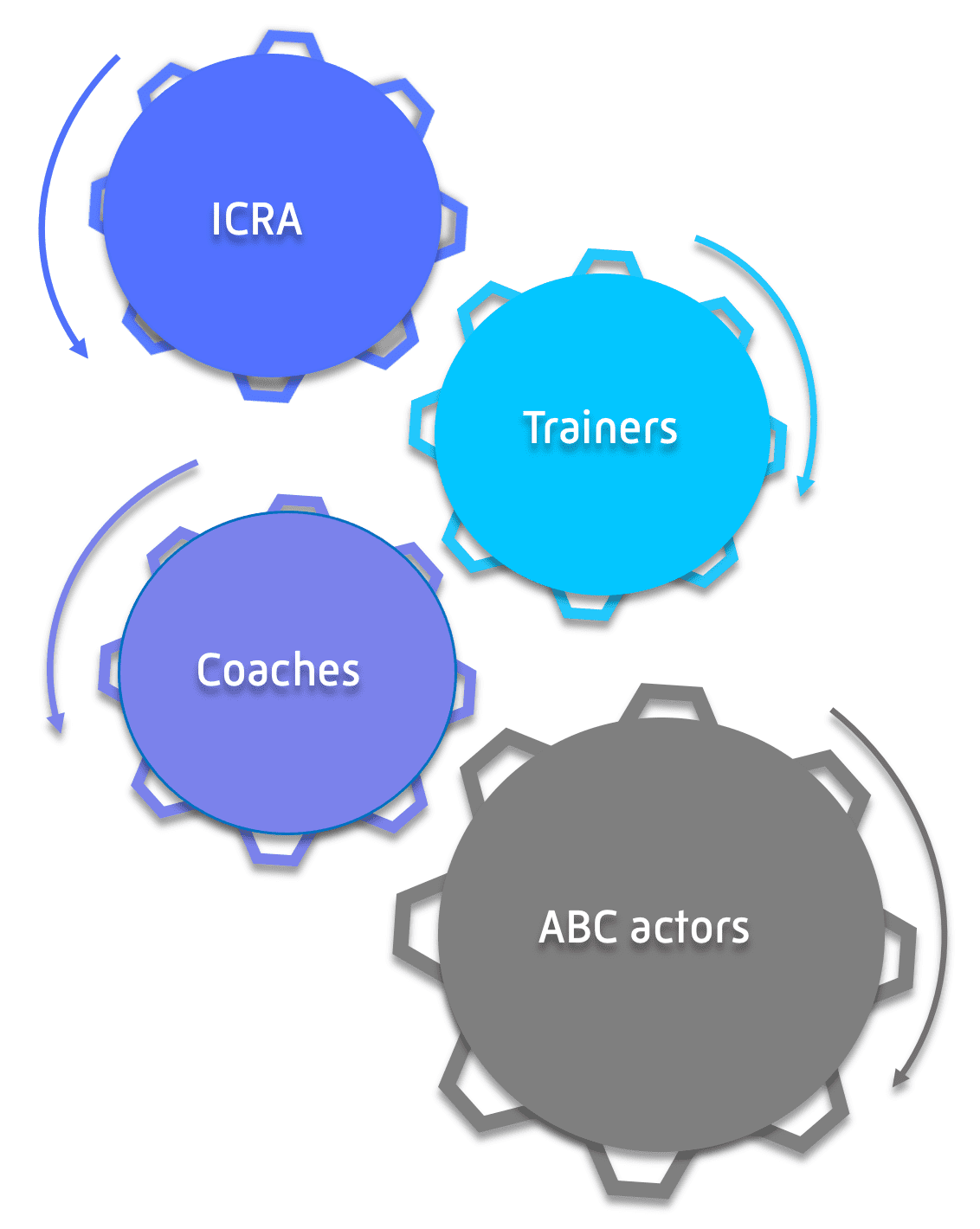iCRA’s service delivery model for agribusiness cluster coaching
Coaching integrated advisory services in Agribusiness Clusters
iCRA has seen the role of advisors in agribusiness changing rapidly. Whereas conventional agricultural advisors mainly work with farmers, iCRA turns these advisors into agribusiness coaches of local value chain partnerships. As such, their role and terms of reference moves from being mostly technical and agronomic advisors for farmers to facilitators and on-the-job coaches of business networks formed as partnerships around a producer organization; or what we call ‘Agri-Business Clusters’ (ABCs). The coaches link lead (aggregating or processing) firms, local producer organizations, traders and agro-input dealers to each other but also involve other supporting actors like banks, insurance companies, and transporters in the ABC.

iCRA’s learning cycles approach
Processors and aggregators regularly face problems with small-scale farmers and vice versa. Farmers for example might choose today’s needs over future business, by side selling their produce to a more lucrative local market rather than their usual off-taker. Or they might buy and apply other seeds and fertilizers then offered and recommended by their main client, thereby compromising the quality of their products.
To remedy these types of supply chain constraints; our agribusiness coaching service includes the following type of tailored activities:
- Diagnosis and Design (D&D) workshop: We mobilize involved actors in your supply chain to jointly identify and analyze the key prevailing technical, financial and organizational business constraints.
- Implementation of coaching cycles: iCRA’s trainers and coaches take you and your business partners through learning cycles on topics jointly identified during the D&D workshop. Each cycle consists of an introductory workshop, on-the-job field coaching and a review & reflection session.
- Review & Capitalization (R&C) workshop: All partnership actors are united after 3 learning cycles to capitalize on progress made, make further enforcing agreements and refine action planning to tackle new or remaining business constraints.

Examples of learning cycles delivered by iCRA
|
Business relationships
|
Deal making
|
|
Business literacy
|
Marketing
|
You can find above learning modules and iCRA’s ABC coaching curriculum here.
iCRA complements technical training with coaching on basic business skills & inter-personal competences
The main task of agribusiness coaches is to identify business constraints, come up with innovative opportunities that can shake ABC actors out of their old habits and ways of working and coordinate joint action. Furthermore, coaches provide training in technical matters, like good agricultural practices, use of new agro-inputs or mechanization techniques. However, these technical skills do not by itself result into better business.
Distrust among actors in emerging agribusiness markets is very common and understandable, yet also a major barrier for business.
Therefore, above all, the coaches focus on basic business skills (how to analyze production costs, identify options for cost reduction and efficiency, develop production, marketing and business plans) and strengthen inter-personal skills (how to build good business relations, negotiate with other players or set-up legal contracts). Watch below video to see Roland – an agribusiness coach in Southern Benin – in action within the 2SCALE programme.
What is the role of iCRA trainers?
The multi-faceted work of agribusiness coaches require them to have a comprehensive combination of skills, competences and appropriate mindset. iCRA therefore developed a service delivery model in which the local-level coaches are trained and mentored by national iCRA trainers.
iCRA trainers provide agribusiness coaches hands-on mentoring and on-the-job support
In close collaboration with the coaches and ABC actors, iCRA trainers design tailor-made coaching plans. Our trainers provide hands-on mentoring and on-the-job support as the agribusiness coaches facilitate their field coaching sessions to ABC actors. Coaching plans typically comprise several learning cycles with each learning cycle consisting of three key activities:
- Introductory workshop: All active coaches are grouped to introduce new concepts, tools, ideas and principles regarding the topic of the next learning cycle. At the end of the workshop, the terms of reference for a specific field assignment are developed.
- Field coaching: iCRA trainers provide individual, on-the-job coaching to the agribusiness coaches and back-up support to the ABC actors they work with.
- Review & reflection session: All active coaches are grouped to review gained experiences and draw lessons for the next learning cycle. In practice, this review workshop is combined with the introductory workshop of the following learning cycle.

Like to learn more?
Read our “Strengthening business support services for agribusiness partnerships” publication discussing in more depth our service delivery model, its methodology and its outcomes illustrated in 10 field stories. Or contact us for more information.
